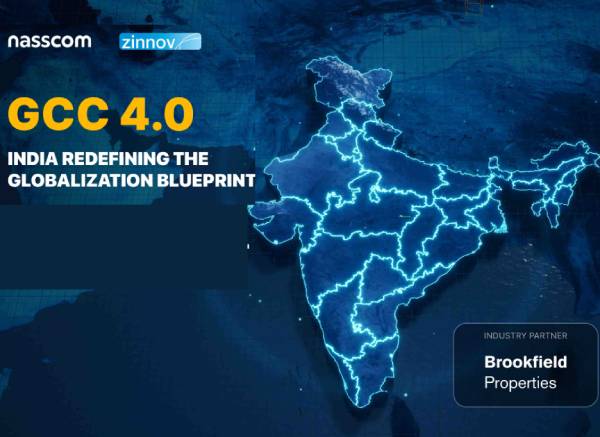
New Delhi, June 2, 2023: India’s abundant availability of highly skilled engineering & digital talent, along with highly mature start-up landscape, and an evolved peer Global Capability Centers (GCC) ecosystem, continue to make India an attractive destination for setting up or expanding GCCs.
Nasscom, in partnership with Zinnov, has released a report titled, “GCC 4.0 – India Redefining the Globalization Blueprint.”
As of FY 2023, India is home to 1580 unique GCCs, with several global MNCs opting to establish their first global center outside of their headquarters in India. These GCCs are not just driving engineering expansion activities but are also co-piloting transformation efforts with their HQ. Be it the building of new products or solutions, driving technology or process breakthroughs, harnessing the strength of open innovation, and even becoming beacons of business excellence lighthouse for their parent organization.
India’s GCC Potential
The growth trajectory of Indian GCCs stays unabated, primarily being fueled by ER&D, which accounts for approximately 56% of the overall GCC revenue share. This growth is supported by long-term strategic deals, widespread adoption of digitalization, and the increased utilization of Cloud technology. At the same time, BPM and IT Services are also experiencing growth, with GCCs expanding their operations in India across locations, including Tier-II Indian cities. While Tier-I cities continue to remain the preferred choice, housing around 90% of the installed GCC talent, there is a noticeable trend of Tier-II and Tier-III cities rapidly catching up. These locations offer operational convenience, cost advantages, and access to a pool of digitally skilled and affordable talent, as attractive value propositions for expanding analytics and operations teams.
Growing on the back of Niche Competencies and Capabilities
With over 1.66 million installed talent pool as of FY 2023, GCCs in India are acting as core technology hubs for their HQ, specializing in niche skills around Cloud, AI/ML/NLP, Cybersecurity, Low Code/No Code, Advanced Analytics, Blockchain, IoT, etc. India GCCs are also playing a pivotal role in exploring emerging technologies such as Web 3.0, Digital Twins, Metaverse, etc., for their parent organizations. Furthermore, India’s abundant AI/ML talent pool offers an enticing prospect for GCCs to establish dynamic Centers of Excellence (COEs) and lead innovation, harnessing the full potential of their India centers. Today, there are over 210 GCCs and 315 centers possessing AI/ML capabilities, with Software & Internet and BFSI sectors taking the lead in these tech-focused COE initiatives.
In the past 2 years, the impact of ER&D remains unstemmed, with the sector contributing more than 42% of the total talent growth. IT and BPM industries have also experienced considerable talent progression, with IT talent growing at a CAGR of 9.8% and BPM talent growing at a CAGR of 10.8%. Interestingly, BPM accounts for more than one-third of the total talent added in the past two years.
From Cost and Talent Arbitrage to Transformational Hubs
GCCs in India today, are charting newer paths and architecting newer dimensions – far from their humble origins as cost arbitrage centers. The Indian GCC ecosystem has become a sandbox for global companies driving organization-wide transformative initiatives. From decentralization and diversification of portfolios to becoming innovation hubs, Indian GCCs are assuming a strategic role in fostering product innovation, driving technological advancements, and spearheading digital transformation initiatives for HQ organizations.
India is becoming a hub not just for innovation and digital capabilities but for digital leadership as well. Indian leaders are now helming global portfolios across both business and technical roles. In fact, India is driving an increasing number of general management roles, which has played a crucial role in propelling the growth of India’s GCCs. Interestingly, global roles from India are projected to have an impressive CAGR of ~19%, resulting in an estimated 20,000 positions by 2030. In 2022, there were over 5,000 global roles present in India, 18% of whom were women leaders. It is also anticipated that by 2030, this ratio will see an upward tick and women leaders will comprise approximately 30% of global roles – a strong progression from the 2022 numbers.
Transitioning to GCC 4.0 Wave
India is set to witness significant growth, with an anticipated 1900+ GCCs, a projected headcount exceeding 2 Mn, and a market size of USD 60 Bn by 2025. Transitioning towards the 4.0 paradigm, GCCs in India are expected to build niche competencies, cultivate global leadership, monetize services, and venture into untapped frontiers. Factors such as peer collaboration, customer-centric business development, setting up future hubs for functions like customer success, driving the transition to an ‘as-a-service’ world are some of the key drivers enabling India’s transition into the GCC 4.0 Wave